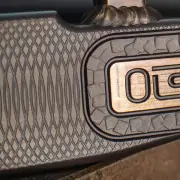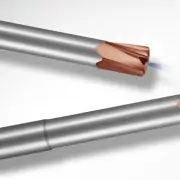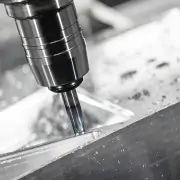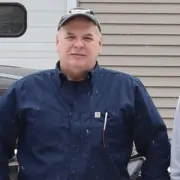Anderson Prototypes – Featured Customer
Featured Image Courtesy of Anderson Prototypes
Anderson Prototypes is a custom machine shop in Port Moody, British Columbia. Working with everything from Titanium to Bamboo, they create mechanical mechanisms and working prototypes of new technology. By applying 25 years of experience with manual and CNC machinery, they craft amazing parts, some even bordering on impossible. The team at Anderson Prototypes works in a variety of industries, ranging from large-scale prototype work to small batch production, machine repair, and even movie and TV props.
Jim Anderson, a 30 year veteran of the manufacturing industry, is the Founder and Owner of Anderson Prototypes. We caught up with Jim and talked to him about some of the “impossible” projects his team likes to take, his experiences in the film industry, and his advice for the aspiring machinist.
Tell us a bit about your shop, how you got started, and what sort of products you manufacture.
I started in machining in 1985, as a full-time student in a machining class at a local community college. I spent years working in jobbing shops, plastic mold injection shops, and specialized start-up companies, scratch building a range of things from high-speed water “pouch” filling machines to hydrogen fuel-cells. Today I work with a wide range of clients including 3 submarine companies, a military contractor, companies that use custom built or modified ROVs and drones, food packaging companies, production companies needing film and TV props, and more.
What made you get into machining?
I have always been an actively creative person, and I enjoyed wood and machine shop in high school. I found a creative outlet for my talents to build and fix things inside the machine shop environment. I continue to study machines and items, to understand how they were made, and how it could be made better or simplified.

Photo Courtesy of: Anderson Prototypes
What is your favorite part of this profession?
I always enjoy creating something for a client that they have been dreaming of, sometimes for years. They come to me with a sketch on a napkin or a verbal idea, and I turn that dream into reality. When they come to pick it up and see it for the first time, the emotions are tremendous!
What sort of machines do you use in your shop?
I have 2 Tormach 1100 CNC mills, one 4 axis and the other 3 axis, a Sherline 2000, 4 axis CNC mill, a Frankenstein CNC lathe with a 8 station tool changer for small work, a Milltronics ML-17 CNC lathe, a Colchester Student Engine Lathe, and a smaller manual milling machine. I also have drill presses, tapping heads and tons of specialized fixturing and work holding devices, as well as a 60 ton hydraulic press and the specialized equipment that comes with it.

Photo Courtesy of: Anderson Prototypes
Which materials do you work with in your shop?
Just about everything. Lots of plastics, PEEK, Delrin and Acrylic, aluminum, steels, stainless steels, carbon fiber, different woods, laminates, and more.
What sets Anderson Prototypes apart from the competition?
We often take on jobs that other shops won’t, due to our team’s large vision. We stand behind every piece we make and have zero returned items to date. Embodying both old-school traditions and cutting-edge technology, Anderson Prototypes believes that “Impossible is just an Opinion”. We work with a project from the very beginning to the time it is up and running at the client’s facility. We work with building very small detailed machines to unique and weird items that someone dreamed up and could not find anyone able to make. We also love to give back to the community. We have sponsored local high school and university students in competitions, and we have played a part in the Maker Community since Day One. We also made and donated a doggy wheelchair to a dog in need (YouTube), and we sponsor a local softball league.
How did you get into the entertainment/prop business?
Vancouver has a huge movie industry, and there are many people in my network that work in the industry. The need for various props, new equipment, and repairs can go up and down as movies are being filmed. The first job I did (I think), was for a movie called Space Buddies, the 4th or 5th entry in the Air Bud movie series. I made the Doggles (dog goggles), that the dog is wearing on the DVD cover. Most movies require a Non-Disclosure Agreements before any work is done, so I can’t talk about much, but I have made my impact on the screen, behind the scenes, and even live on stage. I also did a major prop for an Australian TV show that was apparently popular down under, so you never know where this work will take you!

Photo Courtesy of: Anderson Prototypes
Who is the most famous contact that you have worked on a project with?
I have met many directors and producers of large budget films and TV shows. Unfortunately, because of the Non-Disclosure Agreements, I cannot mention any names.
Why is high-quality tool performance important to you?
I buy all my tooling from North America. I am lucky enough to have a solid carbide tooling manufacturer 5 miles from my shop, so I get quality endmills, made to order. When I need something specialized, Harvey is the only company I go to. When a tool does more than I expect, I make more money and have less stress. I count on that and become a return customer. For example, I used a .018″ Miniature End Mill (#73018-C3) on some acrylic parts I was making. There were 40 parts in total, all around the size of a stamp, with lots of tiny details, high tolerances, and very small features. I had the machine running at 15,500 RPM for 3 weeks, and I only broke one tool in that entire run. What a great tool!
What is your favorite process to work on as a machinist?
I really enjoy making something I have never worked on before, that new challenge. Often it seems that I am designing new items now more than ever. I have to do things that are not being done commercially and I stand behind it. So I might run the manual lathe, the CNC mill and then the CNC lathe on one part. I enjoy the variety.

Photo Courtesy of: Anderson Prototypes
Why is manufacturing your products in North America important to you?
American and Canadian-made products are very important to me. I purchase North American-made products like steel and aluminum, and bearings and fasteners all of kinds. I also access services locally, such as laser cutting, anodizing and powder coating, to support these local businesses. I feel its very important to the customer making the purchase that these are products my neighbors are helping to build.
If you could give one piece of advice to a new machinist ready to take the #PlungeIntoMachining, what would it be?
Take the time to take an accredited machine shop training course, like I did. It will give you all the groundwork to understand the real world of machining. I know a few fellas with small CNCs that can’t make a living because they don’t understand the depth of set-ups or work holding, for example, because they never learned from an expert. They can’t make parts fast enough, they charge 1/2 of what I do, and it takes then 3 times as long, so they simply can’t compete with me. Just be aware that it doesn’t happen overnight; I was a Journeyman Machinist for over 30 years, and still ask for help from my mentors occasionally. Oh, and find yourself a quality machine. Find a good used HAAS, or OKK, or something made in the US, UK or Europe. Your clients will respect you more and it will work longer and more accurately.
Is there anything else you would like to share with the In The Loupe community?
I am grateful for the education I have received from the many journeyman machinists, engineers, mechanics, electricians, pilots, sea captains and more who I have worked beside in my years. I am happy to share and offer problem-solving, sometimes for free, other times at consultation rates. When a young eager person asks me a question, I do the best I can to answer it in a way that benefits them long term. Sometimes they don’t like the answer, but I tell them to come back in 6 months and tell me how it went. That’s when the rubber hits the road.

Photo Courtesy of: Anderson Prototypes
Would you like to be considered for a future “Featured Customer” blog? Click here to submit your information.
Photos courtesy of Anderson Prototypes.








Leave a Reply
Want to join the discussion?Feel free to contribute!